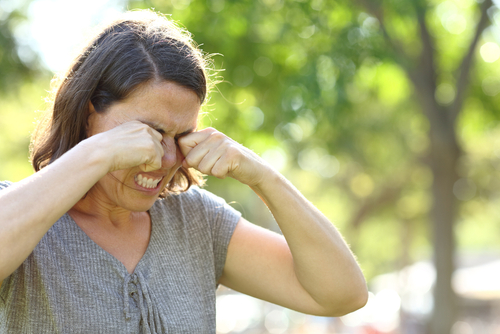Does My Lifestyle Impact If My Eyes Are Dry?

Are your eyes constantly dry and irritated? Do they affect you even when it isn’t allergy season, and you aren’t in an environment that usually gives people dry eyes?
If so, you may have chronic dry eyes or dry eye syndrome, a condition that affects millions of people every year.
There are ways you can treat your dry eye syndrome in the doctor’s office and out of the office. Keep reading to learn more about dry eye syndrome and the lifestyle adjustments you can make to treat it.
What is Dry Eye Syndrome?
Dry eye syndrome is a condition of chronic dry eyes due to inadequate tear quality or quantity. Other common causes of dry eye are underlying conditions like autoimmune disorders, diet, and corneal nerve desensitivity.
One frequent situation that leads to chronic dry eye is low-quality tears that can’t hydrate your eyes. This often stems from meibomian gland dysfunction.
Low-Quality Tears
When your tears lack one or more of their key ingredients, they cannot keep your eyes hydrated. Dry, irritated eyes are the result.
Tears have three primary ingredients. To be healthy, water, oil, and mucus must be present in them.
The water hydrates your eyes and gives them the nutrients they need. Mucus ensures the tears spread evenly across your eyes.
And the oil prevents the tears from evaporating off the surface of your eye. Oil is the ingredient most commonly lacking in tears that cause dry eye syndrome.
If your tears are evaporating due to a lack of oil, you may have an issue with your meibomian glands. These oil-producing glands sit along the edges of your eyelids and can become clogged.
How Do You Treat Dry Eyes?
There are numerous ways to treat dry eye syndrome. Some are in-office treatments, like meibomian gland therapy or eyelid hygiene therapy.
But there are also simple lifestyle changes you can make with the guidance of your eye doctor. Some of the most straightforward fixes for chronic dry eyes are:
Diet
The foods you eat impact the health of your eyes, including the amount of oil they produce. Foods like fish, nuts, seeds, and eggs are all full of healthy omega-3 fatty acids, which help to maintain proper oil levels in your tears.
Clean, Humid Air
Having clean, moist air in your living spaces is vital to eye health. Using an air purifier will keep irritants out of the air, and a humidifier will ensure the air in your home or office isn’t too dry.
Lifestyle Practices
Other simple practices for your dry eyes are more blinking, less screen time, and warm eyelid compresses. Less screen time and more blinking ensure your eyes get more tears on them.
When you look at screens, you blink less. This means fewer tears get on your eyes. By blinking more and using fewer screens, you give your eyes more of the fluids they need to stay lubricated.
Warm compresses on your eyelids help to increase the flow of oil onto the surface of your eyes. This increased flow helps prevent tear evaporation.
Prescriptions and In-Office Treatments for Dry Eye
If these simple practices do not eliminate your dry eye symptoms, enhanced treatment from your eye doctor may be necessary. The most common treatments are artificial tears and other eye drop-like products.
But these eye drops are not available over-the-counter. Your eye doctor will work with you to find the best combination of drops for your situation.
If eye drops don’t eliminate your symptoms, there are other treatments available. You may need in-office treatments like meibomian gland therapy or punctal plugs to end your dry eye syndrome.
Do you feel like your chronic dry eyes are out of control? Schedule an appointment at Ginsberg Ophthalmology in Naples, FL, today! Don’t let dry eyes interfere with your life any longer!





